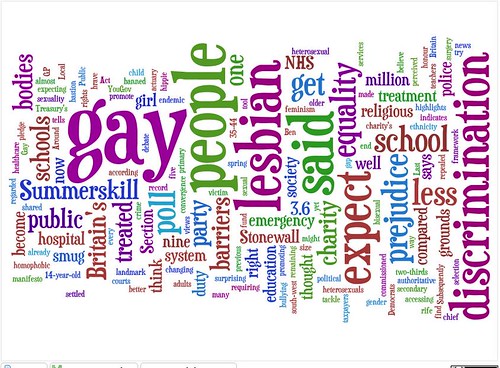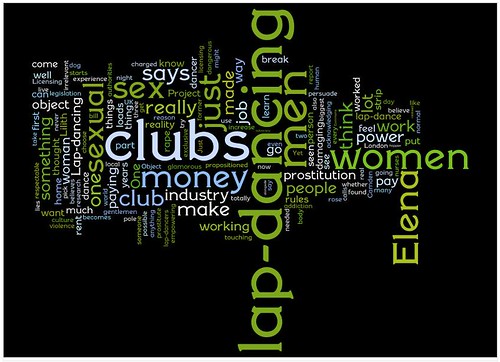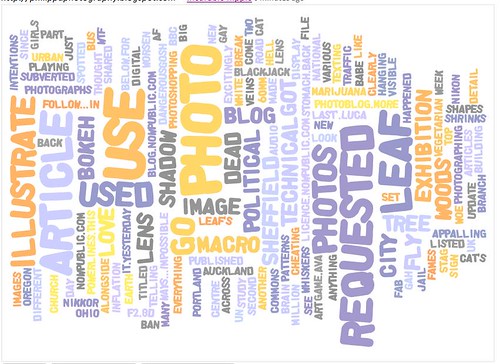"I was seen as an object, not a person" | Lifeandstyle | Life and HealthLap-dancing clubs are advertised as exclusive, glamorous entertainment for 'gentlemen'. As a former dancer tells Rachel Bell, the reality for the women who work in them is both degrading and dangerous
Wednesday March 19, 2008
The Guardian
Lap-dancing clubs
'Just by being there you're acknowledging that you are something the men can pick and choose from.'
Weeks after moving into a new flat, Elena [not her real name] learned that her temping contract was to be cut short - she had to find money to cover the rent as quickly as possible. She had recently met a woman who worked as a lap-dancer, which had reassured her that it "wasn't too dangerous. It made it seem normal." For the next six months, Elena worked for one of the many lap-dancing chains that assures customers that they are "gentlemen", paying for an "exclusive" experience. During that period, any sense that she had had of lap-dancing as just another job was laid firmly to rest.
It wasn't only the earning potential that led Elena to try lap-dancing - she now believes that she, and women in general, are socialised to see it as an inviting occupation. "I thought, well, I'm a sex object anyway, I might as well have it out on the table. It was as though I felt I couldn't do anything else. Everywhere I look I'm being told that my main source of power is my sexual power, my body is the best thing I have to offer and so to use those things in your job is empowering. But sexual power isn't power. It's meaningless in the real world."
Lap-dancing reinforced all Elena's negative beliefs about herself and about men. "The men just see you as an object, not a person, and whether you are equally engaged in their desire is irrelevant. Increasingly, you learn to despise the men because of the way they perceive you. Lap-dancing is about creating a situation whereby the men feel they are doing you a favour - that's the way the game is set up, so all the power is with the customer." She believes that for men who visit lap-dancing clubs, enjoyment derives primarily from handing over the money, not from the dance itself.
Rather than being a lucrative job, in her experience, as soon as a woman starts working at one of the clubs, it costs her money. "You pay 'rent' to the club just to be there and if you can persuade someone to buy a dance, you get £20 - about 20% of which the club takes. Then there are the fines - £10 if you miss your turn to pole dance, if you're late, you're wearing the wrong shoes or you break the rules. There are so many ways to make money from you. You are constantly trying to make as much money as possible out of everybody, otherwise you are literally paying to be there.
"The club management take on more women than are needed in a night so it really becomes dog eat dog. Quite often I made nothing. There were a lot of nights when I would have taken money out and come home with less." The most Elena made in a night was £205. "I love talking to people, but to make any money you really have to act stupid, admire their tie, massage their ego for hours. I could never go to work as anything near myself and that becomes damaging."
The message that working in the sex industry is normal, exciting - sometimes even empowering - is a popular one in our culture. Over the past few years, lap-dancing clubs have proliferated, branding themselves as a respectable part of the leisure industry. At the end of last year, Larry Flynt, the founder of Hustler magazine, opened his first British lap-dancing club in Croydon; Manchester has its first student lap-dancing bar, the Ruby Lounge, and a former stripper has been shown giving a topless lap-dance on Big Brother. Music videos by mainstream artists including Britney Spears, Kylie Minogue, Robbie Williams and Justin Timberlake, have featured lap-dancing or pole dancing, while job centres advertise lap-dancing jobs alongside the more usual calls for human resources managers and chefs.
Yet academic research has linked lap-dancing to trafficking, prostitution and an increase in male sexual violence against both the women who work in the clubs and those who live and work in their vicinity. A recent conference in Ireland highlighted the use of lap-dance clubs by human traffickers as a tool for grooming women into prostitution; the clubs also normalise the idea of paying for sexual services. And a report by the Lilith Project, run by the charity Eaves Housing, which looked at lap-dancing in Camden Town, north London, found that in the three years before and after the opening of four large lap-dancing clubs in the area, incidents of rape in Camden rose by 50%, while sexual assault rose by 57%.
One factor in the proliferation of these clubs is the 2003 Licensing Act which introduced the one-size-fits-all premises licence, meaning that strip clubs are no longer required to get special permission for nudity. The campaign group, Object, which is launching its Lap-Dance Challenge on April 22, wants legislation changed to classify lap-dancing clubs as "sex encounter establishments" and recognise them as part of the sex industry, which would allow local authorities to regulate them as such. Following round-table meetings with supportive MPs and local authorities, it is working to put forward a bill in the Commons.
Sandrine Levêque, advocacy officer at Object, says: "Ten years ago, a handful of lap-dancing clubs operated in the UK. Today that figure is well over 300, according to industry sources. This has been facilitated by liberalisation of the law, which licenses them in the same way as pubs and cafes, and not for what they really are."
The Fawcett Society and the Lilith Project are also calling for tighter controls on lap-dance clubs. In its 2007 report, Inappropriate Behaviour: Adult Venues and Licensing in London, the Lilith Project showed how current licensing policy helps to foster the illusion that all women are sexually available, in a culture in which a rape is reported every 34 minutes, and 26% of people believe that an "inappropriately" dressed woman is "asking for it".
Elena supports the calls for a change in licensing legislation. "I live in a country with unbelievable levels of rape, where two women die every week because they are murdered by their partners ... For me, I suppose, the question is always, why would you want somebody to take their clothes off for you when you know that they don't really fancy you, when you know it isn't what they really want to do?"
The sex industry doesn't just tell lies about women. One of its biggest lies is that it is positive for men. Statistics show that addiction to the porn and sex industries is the third biggest cause of debt in the UK, while sex and relationship therapists are seeing an increase in the number of men suffering from sex addiction. Does Elena think lap-dancing is damaging to men too? "Stag do's, in particular, made me think there must be a lot of crossed wires about it," she says. "I think men are fed just as much bullshit about their sexual identity as women are ... I don't think that it makes anybody happier".
One body of research on strip clubs in the US found that all dancers had suffered verbal harassment and physical and sexual abuse while at work; all had been propositioned for prostitution; and three-quarters had been stalked by men associated with the club.
Was Elena ever verbally abused, or propositioned for prostitution? "Just by being there," she says, "you're acknowledging that you are something that they can pick and choose from, in that dehumanising way. A lot of men are totally blunt, and will say 'I like bigger tits than you've got', or 'How much for a blowjob?' Sometimes men try to persuade you to go back to their houses or to a hotel room for sex. There's a lot of blurring of the understanding of what it is you're supposed to be doing and whether you're actually a prostitute.
"The clubs maintain a veneer of no touching, but touching is more standard than not," she continues. "If I had a boyfriend now and he said he was going to a lap-dancing club, I would consider it to be infidelity. The fact is that if you break the rules, you make more money. If one dancer starts breaking the rules then the pressure is on others to do the same. Otherwise a bloke would think, Well, that dancer charged me £20 and stayed three feet away, but that one charged me just the same and she put her breasts in my mouth and sat on my crotch. Once you've been there a while, you learn that certain things are profitable, and no contact is the first rule you learn to break. Eventually you start to wonder, what is the difference between me and a prostitute?"
Oddly, men who pay a naked woman for a sexual service in a lap-dancing club do not see themselves as "johns", she says. "It's seen as a totally respectable thing for a man to do. Yet I don't feel it's something I'd put on my CV. The respectability is very one-sided."
Elena doesn't believe that lap-dancing is about sex, instead, she says,"It fosters sexual violence. It is damaging even if people are doing it voluntarily. I chose it and that's part of the problem. Even if lap-dancers did make loads of money, it would be irrelevant - paying a lot for something doesn't make it all right. The point about lap-dancing clubs is to ask what they represent culturally and what they do to all of us, not just women working in them".
One reason that Elena stuck with the job was other people's perceptions of it. "The reality didn't matter as long as I could pretend [to myself] that other people thought it was interesting, glamorous or sexy. It's hard to say, 'I am shocked by the reality of it, I do feel degraded, but I need to pay the rent and gas bill'." Research shows that the majority of women become lap-dancers through poverty and lack of choice. "There was definitely a hope among the people who worked there that one day someone would come in who would just pay them loads of money and 'rescue' them," says Elena. "Cinderella thinking, if you like. There were single mothers, nurses - it wasn't what you might think. Some of these women had a whole other career but, for whatever reason, they needed to supplement their income. Some of the nurses would come in knackered after a day on A&E, strip till two in the morning and then go home."
Elena wishes to remain anonymous for self-protection. "The shadowy world behind some clubs is not something that you would want to go up against," she says. "You just know that instinctively." What finally made her leave? "I began to sort myself out a bit and realised that it was a crazy thing to do. I could never be myself. I just suddenly thought, Oh, there are loads of things I could do other than this. This is really shit. I'm going home."


















